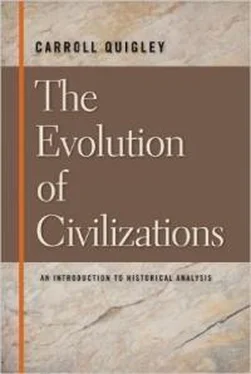As soon as the rate of expansion in a civilization begins to decline noticeably, it enters Stage 4, the Age of Conflict. This is probably the most complex, most interesting, and most critical of all the seven stages. It is marked by four chief characteristics: (a) it is a period of declining rate of expansion; (b) it is a period of growing tension of evolution and increasing class conflicts, especially in the core area; (c) it is a period of increasingly frequent and increasingly violent imperialist wars; and (d) it is a period of growing irrationality, pessimism, superstitions, and otherworldliness. The declining rate of expansion is caused by the institutionalization of the instrument of expansion. The growing class conflicts arise from the increasing tension of evolution, from the obvious conflict of interests between a society adapted to expansion and the vested interests controlling the uninvested surpluses of the institution of expansion who fear social change more than anything else. Usually there is a majority of the frustrated struggling against the minority of vested interests, although usually neither side has any clear idea of the real issues at stake or what would give a workable solution to the crisis. All programs for sharing the surplus of the few among the discontented many are worse than useless, since expansion can be resumed only if the three necessary elements of an instrument of expansion are provided, and the dissipation of surpluses among a large mass of consumers will not provide any one of these three necessary elements. On the contrary most revolutionary programs, aroused by the failure of the third element (investment), will merely make the crisis more acute by destroying the second element (accumulation of surplus). The only sensible or workable solution to the crisis of the civilization would be to reform or circumvent the old institution of expansion by establishing again the three basic elements of any instrument of expansion. Since the disgruntled masses know nothing about such things, and since the vested interests do not know much more and are usually concentrating their energies on an effort to defend their vested interests, a new instrument of expansion, if it appears, usually does so by accident and through the path of circumvention rather than by reform. If a new instrument of expansion does come into existence, the civilization begins to expand again, the tension of evolution and the crisis subside, and the civilization is once again in Stage 3.
The Age of Conflict (Stage 4)is a period of imperialist wars and of irrationality supported for reasons that are usually different in the different social classes. The masses of the people (who have no vested interest in the existing institution of expansion) engage in imperialist wars because it seems the only way to overcome the slowing down of expansion. Unable to get ahead by other means (such as economic means), they seek to get ahead by political action, above all by taking wealth from their political neighbors. At the same time, they turn to irrationality to compensate for the growing insecurity of life, for the chronic economic depression, for the growing bitterness and dangers of class struggles, for the growing social disruption and insecurity from imperialist wars. This is generally a period of gambling, use of narcotics or intoxicants, obsession with sex (frequently as perversion), increasing crime, growing numbers of neurotics and psychotics, growing obsession with death and with the Hereafter.
The vested interests encourage the growth of imperialist wars and irrationality because both serve to divert the discontent of the masses away from their vested interests (the uninvested surplus). Accordingly, some of the defenders of vested interests divert a certain part of their surplus to create instruments of class oppression, instruments of imperialist wars, and instruments of irrationality. Once these instruments are created and begin to become institutions of class oppression, of imperialist wars, and of irrationality, the chances of the institution of expansion being reformed into an instrument of expansion become almost nil. These three new vested interests in combination with the older vested institution of expansion are in a position to prevent all reform. The last of these three, the old institution of expansion, now begins to lose its privileges and advantages to the three institutions it has financed. Of these three, the institution of class oppression controls much of the political power of the society; the institution of imperialist wars controls much of the military power of the society; and the institution of irrationality controls much of the intellectual life of the society. These three (which may be combined into only two or one) become dominant, and the group that formerly controlled the institution of expansion falls back into a secondary role, its surpluses largely absorbed by its own creations. In this way, in Mesopotamian civilization, the Sumerian priesthood, which had been the original instrument of expansion, fell into a secondary role behind the secular kings it had set up to command its armies in the imperialist wars of its Age of Conflict. In the same way in Classical civilization the slaveowning landlords who had been the original instrument of expansion were largely eclipsed by the mercenary army that had been created to carry on the imperialist wars of the Age of Conflict but took on life and purposes of its own and came to dominate Classical civilization completely. So too the Nazi party, which had been financed by some of the German monopoly capitalists as an instrument of class oppression, of imperialist war, and of irrationality, took on purposes of its own and began to dominate the monopoly capitalists for its own ends.
As a result of the imperialist wars of the Age of Conflict, the number of political units in the civilization is reduced. Eventually one unit emerges triumphant. When this occurs we are in Stage 5, the Stage of Universal Empire. Just as the core area passes from Stage 3 to Stage 4 earlier than the peripheral area does, so the core area comes to be conquered by a single state before the whole civilization is conquered by the universal empire. In Mesopotamia the core area was conquered by Babylonia as early as 1700 B.C., but the whole civilization was not conquered by a universal empire until Assyria about 725 B.C. (replaced by Persia about 525 B.C.). In Classical civilization the core area was conquered by Macedonia about 330 B.C.; the whole civilization was conquered by Rome about 146 B.C. Western civilizationhas gone from Stage 3 to Stage 4 three different times. The three Ages of Conflict are: (a) the period of the Hundred Years' War, say 1300-1430; (b) the period of the Second Hundred Years' War, say 1650-1815; and (c) the period of war crisis that began about 1900 and still continues. In each case the core was conquered by an imperialist state: by England under Henry V about 1420, by France under Napoleon about 1810, and by Germany under Hitler about 1942. In the first two cases the old institution of expansion (chivalry and mercantilism) was circumvented by a new instrument of expansion (commercial capitalism and industrial capitalism), and a new period of expansion commenced. In the third case it is too early to see what has happened. We may be getting a new instrument of expansion that will circumvent monopoly capitalism and bring our civilization once again into a period of expansion. Or we may continue in the Age of Conflict until the whole of our civilization comes to be dominated by a single state (probably the United States).
In the imperialist wars of Stage 4 of a civilization the more peripheral states are consistently victorious over less peripheral states. In Mesopotamian civilization the core states like Uruk, Kish, Ur, Nippur, and Lagash were conquered by more peripheral states like Agade and Babylon. These in turn were conquered by peripheral Assyria, and the whole of western Asia was ultimately conquered by fully peripheral Persia. In Minoan civilization the core area of
Читать дальше










